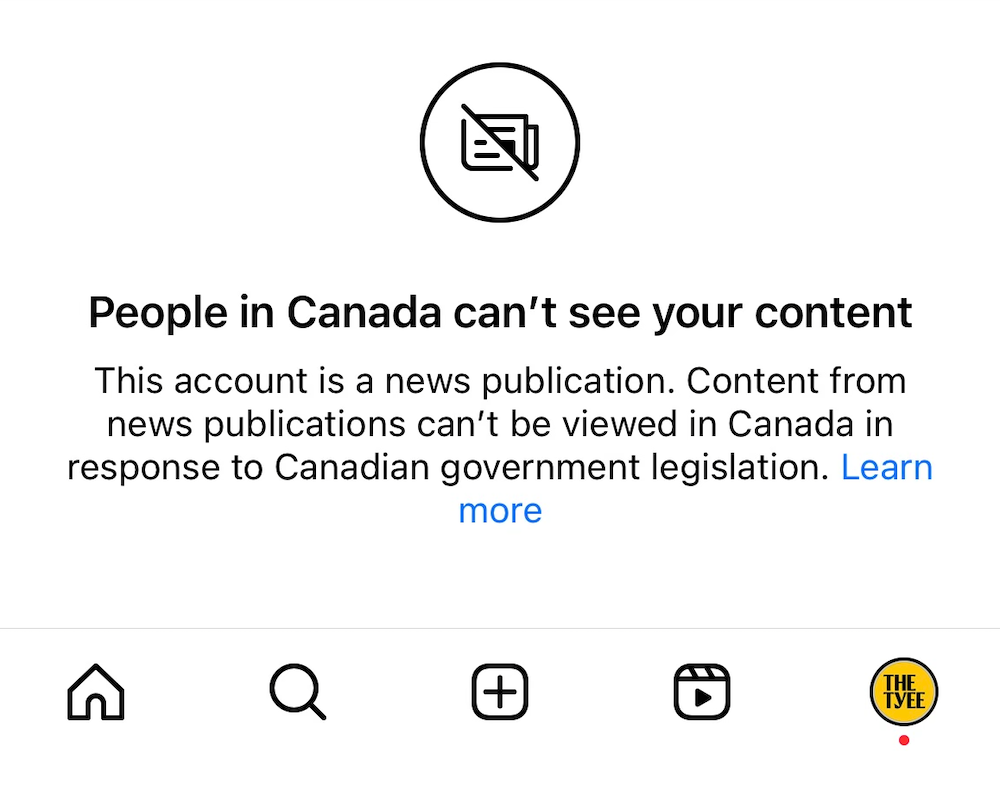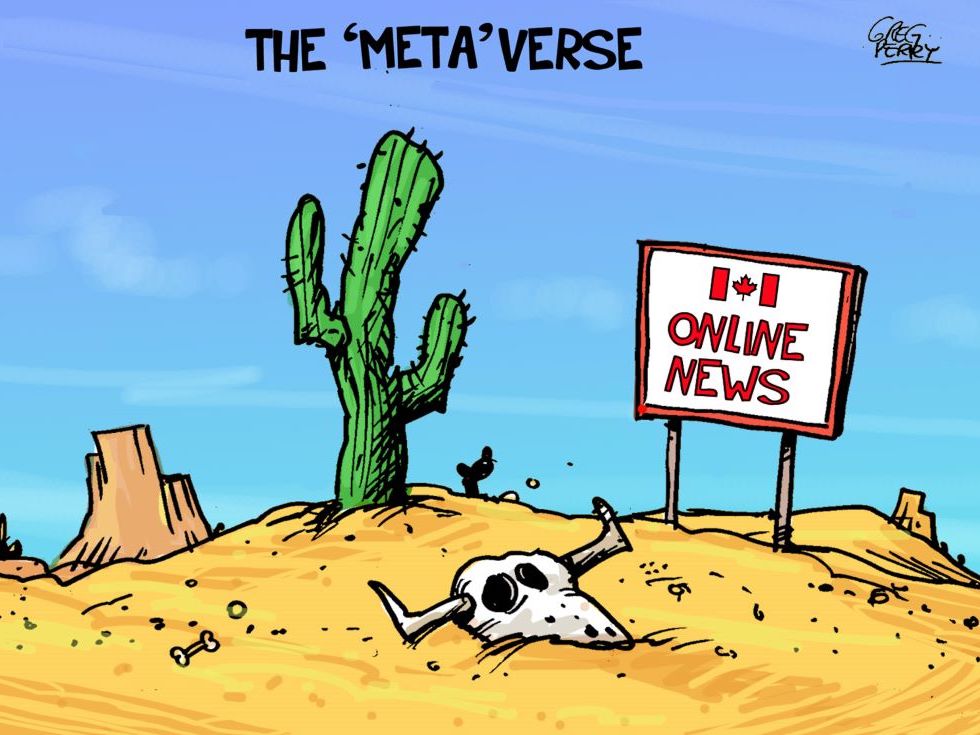Journalists and news consumers can exhale. Canadian news will not be blocked on Google, at least not any time soon. But another digital giant, Mark Zuckerberg’s $840-billion Meta, remains defiant in stripping Canadian news from its Facebook and Instagram.
That’s where we are on this the day the contentious Online News Act comes into effect. How did we get here and what lies ahead?
In an effort to prop up an industry facing continued mass layoffs, social media rife with disinformation, the rise of the AI deepfake, and targeted blows to the role of journalists, Bill C-18, otherwise termed the Online News Act, was born.
The original vision was to force major digital news intermediaries — Meta and Google — into striking commercial deals with publishers to pay them for their content. This would level the uneven playing field, argued Ottawa and many in the journalism sector, after tech companies swamped the ad business the journalism industry once largely relied on.
But the final draft of the bill, released Friday, looks very different. Given Meta’s news ban and concessions granted Google, some — including the New York Times — are questioning whether the Online News Act effectively delivered on its aims.
On Nov. 29, the Canadian government announced Google will provide the Canadian news industry with a capped $100 million annually, indexed to inflation. Ottawa provided some stipulations Friday for that collective pool of money, with two-thirds to go to written media, such as newspapers, and a limit on CBC’s bonus, but the rest to be distributed by industry players themselves.
On the other hand, Meta, to remove itself from the situation, banned all news links from Facebook and Instagram, taking a significant toll on traffic and discoverability for publishers — especially tough for small and startup publications.

What many called a “game of chicken” between Big Tech and the Canadian government resulted in a bailout much lower than the hoped-for $179 million. Other unintended consequences include views of Canadian news dropping 90 per cent, a local news outlet “slowing down over the next while” due to a drastic drop in traffic, Canadians’ lives at risk when they were without reliable news during wildfire emergencies, and less reliable information while disinformation spreads.
After a nearly two-year-long rigmarole, the act is now in full force. Here is a timeline leading up to this moment. Revisit this file as we continue to update it as further developments arise.
Introducing Bill C-18
April 5, 2022
Then-heritage minister Pablo Rodriguez introduces the Online News Act to the House of Commons. News Media Canada, which includes legacy publishers like Postmedia, the Globe and Mail and Torstar, had lobbied for the bill, urging the government to create legislation similar to the News Media Bargaining Code passed in Australia.
Major amendments, please
May 2022
While Google is in favour of enabling a diverse news ecosystem, the bill, as is, would harm journalism, prop up propaganda and risk limiting what Canadians can access on Google, a spokesperson said in a statement. The Independent Online News Publishers of Canada coalition, which The Tyee is a part of, argues later this month that the bill risks disproportionately benefiting large news organizations and shutting out digital startups and indie media. It asks for a universal funding model, compensation based on editorial expenditure that includes freelancers and the inclusion of news startups.
We’re better off without news, says Meta
Oct. 21, 2022
Meta argues that Bill C-18 misrepresents the relationship between publishers and digital platforms and that publishers benefit from posting to Facebook. It also notes news makes up just three per cent of its content and its users say they want less political content, anyway. Most notably, it states that if the bill becomes law as is, the company “may be forced to consider whether we continue to allow the sharing of news on Facebook in Canada.”
Google dabbles in making news disappear
Feb. 22, 2023
Google’s pilot to end news availability impacts four per cent of Canadian users. Tyee publisher Jeanette Ageson reveals that she herself was affected by the ban, unable to find Tyee news or any news articles on Google. “Blocking news is a major threat to Google’s reputation, because it degrades its product and breaks its brand promise, and could actually be dangerous if the search tool doesn’t tell the user it has blocked news results,” she writes in our pages.
News will be banned on Facebook and Instagram, confirms Meta
June 1, 2023
In order to comply with legislation, Meta confirms that news links and content from publishers and broadcasters will no longer be viewable by people in Canada. That includes audiovisual content and international news content. News outlets can still post through the Meta Business Suite and use advertising tools, but Canadian users will not view the content they post.
Meta’s turn to test banning news
June 22, 2023
Meta begins its test of blocking five per cent of Canadian Facebook and Instagram users from viewing or posting news links. That includes posts in the form of photos, Reels and Stories on Instagram. Many news outlets report being unable to post to Instagram via the app. As newsrooms weigh the threats, some outlets emphasize the importance of their Facebook traffic and some try to see a silver lining in working toward a more direct relationship with their audiences.
The bill is passed and the countdown begins
June 22, 2023
The Online News Act receives royal assent and will come into force no later than 180 days after this date. Meta confirms it will comply with the bill by ending news availability before the bill is in full force, as previously suggested.
Google says it will end Canadian news availability
June 29, 2023
Google joins Meta in a promise to block news if Bill C-18 goes into effect as it stands. The near-monopoly search engine confirms in a statement it will remove Canadian news links from its search engine, Google News and Google Discovery and will also end Google News Showcase in Canada in order to comply.
Canada, Quebec and BC pull ads from Meta
July 2023
On July 5, then-heritage minister Rodriguez announces that the government is pulling all ads on Instagram and Facebook in light of Meta’s “unreasonable” decision to pull news from its platforms. Quebec follows suit within hours, and B.C. reverses direction a week later, The Tyee reports, and stops most advertising on Facebook and Instagram.
Canadian Heritage says let’s make this work
July 10, 2023
The government attempts to respond to some of the tech companies’ concerns: it wants to determine a threshold for tech companies’ contributions, emphasize that non-monetary offerings to the sector, such as training, would be encouraged as well, consider existing agreements and provide more clarity on what publications are actually included among Indigenous and non-English-language outlets.
The jig is up for The Tyee: no more Instagram for us
July 11, 2023
On an otherwise normal Tuesday afternoon, The Tyee opens our Instagram account only to be met with an error message that “people in Canada can’t see your content” as a response to Canadian legislation. More and more news outlets report being blocked as well.

Goodbye Pablo, hello Pascale
July 26, 2023
A cabinet shuffle swaps Rodriguez as heritage minister with Pascale St-Onge. Known for her time as sports minister and for freezing federal funding for Hockey Canada during its sexual assault scandal, St-Onge says she will stand her ground on the Online News Act.
OK, for real this time, goodbye news on Facebook
Aug. 1, 2023
Many thought it was a bluff, but Meta makes good on its promise to end news availability on its platforms. Some point out that this doesn’t mean Meta won’t bring news back. Later in August, Heritage Minister St-Onge has “constructive” consultations with Meta and Google — although their stances, and therefore the impasse, appear to remain the same.
You got a deal, Google!
Nov. 29, 2023
"We have found a path forward,” says St-Onge. Google gets a cap on its financial liability toward publishers in the form of $100 million annually.
Meta’s not out of the woods: Ottawa
Dec. 5, 2023
News consumers are finding creative ways to share news content on Facebook and Instagram. “People are finding loopholes,” says St-Onge, who “absolutely” wants the Canadian Radio-television and Telecommunications Commission, overseeing the implementation of the act, to look into whether Meta could still be subject to the act.
The act is in full force
Dec. 19, 2023
Now that the Online News Act is being enforced, some questions remain, such as whether Meta will be liable for news content that gets shared on its platforms, how industry players will divvy up Google’s funds, and the fallout of news links being banned on major social media.
We’ll continue to update this file as further developments arise.
This article is part of an occasional series on how Canadian media became intertwined with major tech platforms, and how it’s affecting Canadians and their access to journalism.
If you want to stay in direct contact with The Tyee, sign up for our free newsletter here. ![]()


















Tyee Commenting Guidelines
Comments that violate guidelines risk being deleted, and violations may result in a temporary or permanent user ban. Maintain the spirit of good conversation to stay in the discussion and be patient with moderators. Comments are reviewed regularly but not in real time.
Do:
Do not: